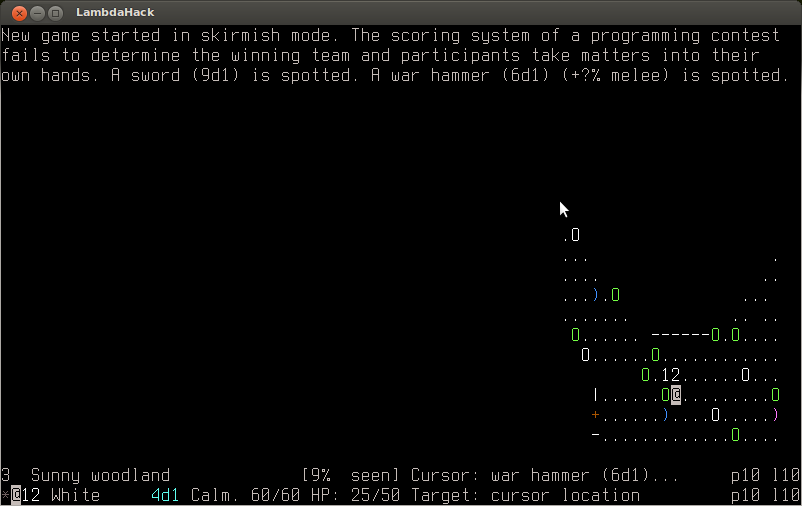LambdaHack: A game engine library for roguelike dungeon crawlers
LambdaHack is a game engine library for roguelike games of arbitrary theme, size and complexity, packaged together with a small example dungeon crawler.

When completed, the engine will let you specify content to be procedurally generated, define the AI behaviour on top of the generic content-independent rules and compile a ready-to-play game binary, using either the supplied or a custom-made main loop. Several frontends are available (GTK is the default) and many other generic engine components are easily overridden, but the fundamental source of flexibility lies in the strict and type-safe separation of code and content and of clients (human and AI-controlled) and server. Please see the changelog file for recent improvements and the issue tracker for short-term plans. Long term vision revolves around procedural content generation and includes in-game content creation, auto-balancing and persistent content modification based on player behaviour.
Games known to use the LambdaHack library:
Allure of the Stars, a near-future Sci-Fi game, http://hackage.haskell.org/package/Allure
Space Privateers, an adventure game set in far future, http://hackage.haskell.org/package/SpacePrivateers
Note: All modules in this library are kept visible, to let games override and reuse them. OTOH, to reflect that some modules are implementation details relative to others, the source code adheres to the following convention. If a module has the same name as a directory, the module is the exclusive interface to the directory. No references to the modules in the directory are allowed except from the interface module. This policy is only binding inside the library --- users are free to do whatever they please, since the library authors are in no position to guess their particular needs.
[Skip to Readme]
Modules
[Index]
- Game
- LambdaHack
- Game.LambdaHack.Atomic
- Game.LambdaHack.Client
- Game.LambdaHack.Client.AI
- Game.LambdaHack.Client.Bfs
- Game.LambdaHack.Client.BfsClient
- Game.LambdaHack.Client.CommonClient
- Game.LambdaHack.Client.HandleAtomicClient
- Game.LambdaHack.Client.HandleResponseClient
- Game.LambdaHack.Client.ItemSlot
- Game.LambdaHack.Client.Key
- Game.LambdaHack.Client.LoopClient
- Game.LambdaHack.Client.MonadClient
- Game.LambdaHack.Client.ProtocolClient
- Game.LambdaHack.Client.State
- Game.LambdaHack.Client.UI
- Game.LambdaHack.Client.UI.Animation
- Game.LambdaHack.Client.UI.Config
- Content
- Game.LambdaHack.Client.UI.DisplayAtomicClient
- Game.LambdaHack.Client.UI.DrawClient
- Game.LambdaHack.Client.UI.Frontend
- Game.LambdaHack.Client.UI.HandleHumanClient
- Game.LambdaHack.Client.UI.HandleHumanGlobalClient
- Game.LambdaHack.Client.UI.HandleHumanLocalClient
- Game.LambdaHack.Client.UI.HumanCmd
- Game.LambdaHack.Client.UI.InventoryClient
- Game.LambdaHack.Client.UI.KeyBindings
- Game.LambdaHack.Client.UI.MonadClientUI
- Game.LambdaHack.Client.UI.MsgClient
- Game.LambdaHack.Client.UI.RunClient
- Game.LambdaHack.Client.UI.StartupFrontendClient
- Game.LambdaHack.Client.UI.WidgetClient
- Common
- Game.LambdaHack.Common.Ability
- Game.LambdaHack.Common.Actor
- Game.LambdaHack.Common.ActorState
- Game.LambdaHack.Common.ClientOptions
- Game.LambdaHack.Common.Color
- Game.LambdaHack.Common.ContentDef
- Game.LambdaHack.Common.Dice
- Game.LambdaHack.Common.Effect
- Game.LambdaHack.Common.EffectDescription
- Game.LambdaHack.Common.Faction
- Game.LambdaHack.Common.Feature
- Game.LambdaHack.Common.File
- Game.LambdaHack.Common.Flavour
- Game.LambdaHack.Common.Frequency
- Game.LambdaHack.Common.HighScore
- Game.LambdaHack.Common.Item
- Game.LambdaHack.Common.ItemDescription
- Game.LambdaHack.Common.ItemStrongest
- Game.LambdaHack.Common.Kind
- Game.LambdaHack.Common.LQueue
- Game.LambdaHack.Common.Level
- Game.LambdaHack.Common.Misc
- Game.LambdaHack.Common.MonadStateRead
- Game.LambdaHack.Common.Msg
- Game.LambdaHack.Common.Perception
- Game.LambdaHack.Common.Point
- Game.LambdaHack.Common.PointArray
- Game.LambdaHack.Common.Random
- Game.LambdaHack.Common.Request
- Game.LambdaHack.Common.Response
- Game.LambdaHack.Common.Save
- Game.LambdaHack.Common.State
- Game.LambdaHack.Common.Thread
- Game.LambdaHack.Common.Tile
- Game.LambdaHack.Common.Time
- Game.LambdaHack.Common.Vector
- Content
- SampleImplementation
- Game.LambdaHack.Server
- Game.LambdaHack.Server.Commandline
- Game.LambdaHack.Server.CommonServer
- Game.LambdaHack.Server.DebugServer
- Game.LambdaHack.Server.DungeonGen
- Game.LambdaHack.Server.EndServer
- Game.LambdaHack.Server.Fov
- Game.LambdaHack.Server.HandleEffectServer
- Game.LambdaHack.Server.HandleRequestServer
- Game.LambdaHack.Server.ItemRev
- Game.LambdaHack.Server.ItemServer
- Game.LambdaHack.Server.LoopServer
- Game.LambdaHack.Server.MonadServer
- Game.LambdaHack.Server.PeriodicServer
- Game.LambdaHack.Server.ProtocolServer
- Game.LambdaHack.Server.StartServer
- Game.LambdaHack.Server.State
- LambdaHack
Flags
Automatic Flags
| Name | Description | Default |
|---|---|---|
| vty | switch to the vty frontend | Disabled |
| curses | switch to the curses frontend (not fully supported) | Disabled |
| expose_internal | expose internal functions and types (True for release, False for development) | Enabled |
Use -f <flag> to enable a flag, or -f -<flag> to disable that flag. More info
Downloads
- LambdaHack-0.4.9.0.tar.gz [browse] (Cabal source package)
- Package description (as included in the package)
Maintainer's Corner
For package maintainers and hackage trustees
Candidates
- No Candidates
| Versions [RSS] | 0.1.20080412, 0.1.20080413, 0.1.20090606, 0.1.20110117, 0.1.20110918, 0.2.0, 0.2.1, 0.2.6, 0.2.6.5, 0.2.8, 0.2.10, 0.2.10.5, 0.2.10.6, 0.2.12, 0.2.14, 0.4.9.0, 0.4.99.0, 0.4.100.0, 0.4.101.0, 0.4.101.1, 0.5.0.0, 0.6.0.0, 0.6.1.0, 0.6.2.0, 0.7.0.0, 0.7.1.0, 0.8.0.0, 0.8.1.0, 0.8.1.1, 0.8.1.2, 0.8.3.0, 0.9.3.0, 0.9.3.1, 0.9.4.0, 0.9.4.1, 0.9.5.0, 0.10.2.0, 0.10.3.0, 0.11.0.0, 0.11.0.1 (info) |
|---|---|
| Change log | CHANGELOG.md |
| Dependencies | array (>=0.3.0.3 && <1), assert-failure (>=0.1 && <1), async (>=2 && <3), base (>=4 && <5), binary (>=0.7 && <1), bytestring (>=0.9.2 && <1), containers (>=0.5 && <1), deepseq (>=1.3 && <2), directory (>=1.1.0.1 && <2), enummapset-th (>=0.6.0.0 && <1), filepath (>=1.2.0.1 && <2), ghc-prim (>=0.2), gtk (>=0.12.1 && <0.14), hashable (>=1.1.2.5 && <2), hscurses (>=1.4.1 && <2), hsini (>=0.2 && <2), keys (>=3 && <4), LambdaHack, miniutter (>=0.4.1 && <2), mtl (>=2.0.1 && <3), old-time (>=1.0.0.7 && <2), pretty-show (>=1.6 && <2), random (>=1.0.1 && <2), stm (>=2.4 && <3), template-haskell (>=2.6 && <3), text (>=0.11.2.3 && <2), transformers (>=0.3 && <1), unordered-containers (>=0.2.3 && <1), vector (>=0.10 && <1), vector-binary-instances (>=0.2 && <1), vty (>=4.7.0.6 && <5), zlib (>=0.5.3.1 && <1) [details] |
| License | BSD-3-Clause |
| Author | Andres Loeh, Mikolaj Konarski |
| Maintainer | Mikolaj Konarski <mikolaj.konarski@funktory.com> |
| Category | Game Engine, Game |
| Home page | http://github.com/LambdaHack/LambdaHack |
| Bug tracker | http://github.com/LambdaHack/LambdaHack/issues |
| Source repo | head: git clone git://github.com/LambdaHack/LambdaHack.git |
| Uploaded | by MikolajKonarski at 2014-08-11T22:38:00Z |
| Distributions | Arch:0.11.0.1, Debian:0.9.5.0, LTSHaskell:0.11.0.1, NixOS:0.11.0.1 |
| Reverse Dependencies | 2 direct, 0 indirect [details] |
| Executables | LambdaHack |
| Downloads | 30369 total (176 in the last 30 days) |
| Rating | 2.25 (votes: 2) [estimated by Bayesian average] |
| Your Rating | |
| Status | Docs available [build log] Successful builds reported [all 1 reports] |



